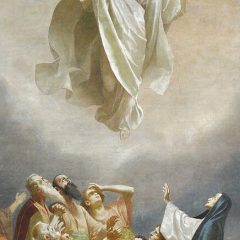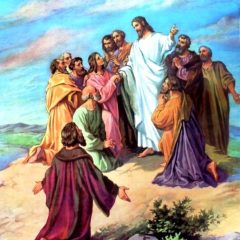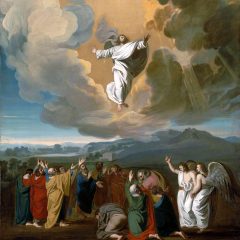Ascension
Hello…Goodbye!
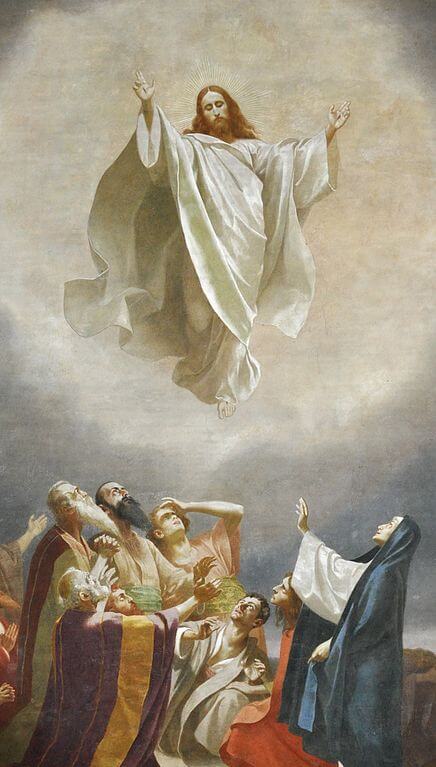
The Ascension Of The Lord
Fr. Ed Hampson
Preached: May 21, 2023
There are moments in life when we say ’hello’ and we say ‘goodbye.’ It happens all through our lives. We learn in childhood that every Hello leads to an eventual Goodbye. And then there are moments that come along where hello and goodbye seem to come at the same time. And when they do, there seems to be a moment between those two things when something happens that sort of holds them together.
The English words “good bye,” the Spanish words “a dios,” and the French words “a dieu” . . . goodbye, adios, adieu, all imply that when we part, in that moment between being here & not being here, between presence & absence, we do well to give someone to God when we can no longer hold them ourselves. Good bye… comes from the words “God be with you.”
In today’s gospel reading & in the 1 reading from Acts, we hear about Jesus’ ASCENSION into heaven. The disciples have questions that are simple, almost childlike, in this story. Like when Mommy & Daddy are getting ready to go out for the evening, and the kids look up from their play & ask “Where are you going?” “Can we come too?” “Who will look after us?”
So, Jesus is about to go. “What’s to become of us?’ He tells them “I am sending upon you what my Father has promised her.” I will not leave you alone or desolate. And it was true. The Paraclete, the Holy Comforter, would come. ’God be with you” Good bye. A poignant moment,
Once upon a time a Mom & Dad & their 7 year old daughter (anyone here who’s 7?) went to a park to fly a kite. The kite was carried way up high by the wind. It soared higher & higher until it disappeared from sight. “Is the kite still up there?” asked the little girl. “Oh yes” answered her Mom. “But how do you know it’s there?” asked her daughter. “Here, hold the string” her Dad said. The little girl took the string & after a few minutes she said “I can feel it. I can fee the tag on he string!”
The Ascension meant that Jesus ’disciples would no longer see him as they had after his resurrection. But they were still able to know Jesus and feel his presence even as he disappeared from their sight, because they had come to know him and had faith in him. And it’s important for us to pay attention to that and think about that.
Many years ago, when I was doing graduate studies at McGill University, I had a professor for whom I had a great deal of respect. His name was Eric Jay, and he taught Historical Theology. Prof. Jay was an elderly English Christian gentleman who was as brilliant & knowledgeable as he was humble.
I’ll always remember him lecturing on the Ascension. He said that his own research had led him to the conviction that amongst the people of the earliest Church, Christians valued the ascension as much as they did the resurrection. Because this was the Messiah of God, the Christ who had come to them from God, who was now returning to the Father.
And the fact that the disciples witnessed this was a kind of verification of their faith. It gave them courage, strengthened their conviction, and prepared them for the road ahead. One thing I came to value in particular about the Ascension, thanks to Prof. Jay, was that, from the perspective of our faith, it really is like a multi labeled diamond; it sends it’s light out in many different directions at the same time. This is one of those directions.
Professor Jay reminded us that the ancient Greeks had a particular word for us human beings: “anthropos,” & that if you translate ‘anthropos’ literally, it means “the upward looking creature.” That is, our ability to look up & out beyond ourselves to God is what makes us uniquely human.
With the Ascension, we see the disciples looking up to Jesus as he takes his leave. But… there is more here. Because, in other ways, the disciples had already been looking up to Jesus throughout his ministry. They saw his courage, his self sacrifice, his compassion for people, they heard his wisdom, his understanding, his teaching, they saw him bring healing & hope to people. They looked up to him because of what they saw. And, more and more, they wanted to be like him. That that is so important.
Human development theorists call that “idealizing.” It’s about our search, as we grow & develop, for someone or something to look up to: an ideal to make our own; a worthwhile purpose or standard to grow towards, a person who embodies what we are coming to value and whom we respect and admire; a stable, calm, powerful Other whom we choose to model ourselves after.
The disciples had already been looking up to Jesus, so, in a way, looking up to him at the Ascension was the most natural expression of their relationship with Him that there could be. The Ascension was about Jesus, but it was also about them… about them becoming people in whom others could find Christ. Like them, we are meant to become what we see in Christ; it’s how we fulfill our God given destiny.
Somewhere in our own journeys through life, we will come to moments when we find ourselves saying hello and goodbye. In those moments, our whole lifetime of becoming can make a world of difference. When we have become more like Him our life will have become a sign of God’s presence. When we choose to live our life in faith, our life looks more like His:
- It’s you and me choosing to pray at the dinner table and share our life with God each day.
- It’s choosing to forego selfishness and look to the good of others and even to protect them whenever we can because they are our brothers and sisters.
- It can even be about letting go of that opinion we’ve held onto so tightly, so that we can conform our behaviour more to His.
- It’s coming to Mass and expressing our love for God and our need for God’s guidance.
- It’s about standing up to injustice and about bringing healing and support and hope where we can. It’s about caring for those whose circumstances are more challenging than our own.
- It’s about holding and being held by our faith. And our parents, our children, our grandchildren, our friends, our neighbours, our colleagues need to see IN US the difference that that faith makes in our lives, so that they too can become more like Him.
That is what matters in those moments between hello & goodbye, when the arc of our lives reaches out for what ultimately holds us together and brings us to God’s kingdom.
Once upon a time there was a mother who would take her little boy to nursery school. She would kiss him good bye and she’d always say to him ”Darling, I’m leaving you in good hands, OK?” She did this every day she took her son to school. The years went by… and became decades upon decades. When the son was well into his adult years and his mother was quite old and experiencing dementia, she needed care to be available 24/7. So they made the decision to place her in an extended care home. The day came, and the son took his dear mom to the care home. And as he said good bye on the first day that she was there, he remembered the words his mother had said to him when he was quite young; so he kissed her and said, “Mom I’m leaving you in good hands.” And his mother, who could hardly remember things now because of dementia held on to her son’s hands and tears started flowing down from her eyes, She remembered her very own words from years ago. “I’m leaving you in good hands.” Good bye. “God be with you.” what is new will come, & I will be with you.
Jesus’ Ascension is something all of us can look up to. He was saying to them… and to us “I’m leaving you in good hands.” For us, the Ascension means that our inevitable good bye will also mean an everlasting ’hello.’ We can trust Him with who we are, and we can become more like who He is. Amen.
Mission-Oriented

7th Sunday of Easter
Fr. Paul Patrick, O.M.I.
Posted: May 16, 2021
“God has gone up with a shout, the Lord with the sound of a trumpet. Sing praises to God, sing praises; sing praises to our King, sing praises” (cf Psalm 47)
- Intro:
This Sunday in the Catholic church we celebrate the feast of the Ascension. The celebration of this feast is quite old and dates back to the 4th century. The name “Ascension” comes from the Latin ascensio (lit. ascent/rising up) which signifies that Christ was raised by his own power – underlining his divinity. Some elderly people or those from parts of Southern or Eastern Europe may recall celebrating Ascension on a Thursday, whereas today we celebrate it on a Sunday. This change was made in order to make it easier for people to celebrate this feast without conflicts from work and school and so Dioceses in Canada and many other countries moved the celebration of this feast to Sunday.
- In the Gospel
When Jesus physically ascends into Heaven following His Resurrection, the 11 apostles are seemingly left on their own (cf Mk 16:19) Instead of being dismayed by this event, the faithful are encouraged by Jesus’ continued presence among them – in the Eucharist, through prayer and in one another, and begin to act in accordance with Jesus’ wishes “Go into all the world and proclaim the good news to the whole creation” (Mk 16:15) They go out and begin preaching the good news or “Gospel” of salvation quite literally in all directions: “And they went out and proclaimed the good news everywhere, while the Lord worked with them and confirmed the message by the signs that accompanied it.” (Mk. 16:20)
- Mission oriented
If we look at the general attitude of the early Christian community following the Ascension and slightly later following Pentecost, they embodied a mission-oriented Church, one which actively seeks to go out and meet people in order to bring them the Gospel message. In his beautiful encyclical entitled “Evangelii Gaudium” (The Joy of the Gospel) Pope Francis had much to say on how the Church today at every level must also embody this outward oriented mission. Perhaps this quote from Evangelii Gaudium sums it up best: “I dream of a “missionary option” – that is, a missionary impulse capable of transforming everything, so that the Church’s customs, ways of doing things, times and schedules, language and structures can be suitably channeled for the evangelization of today’s world rather than for her [own] self-preservation”
- Evangelization
These words of the Pope combined with the command of Jesus immediately prior to his Ascension (cf Mk. 16:15) provide an effective road map for our own life of faith at whatever local level we find ourselves. In terms of practicality, sometimes we fail to even start reaching out to others, or in our families or in our parishes, perhaps due to a type of ‘perfectionism” which holds us back due to fear. Such fear can be crippling, because it does not allow God’s grace and inspiration to work within us, and we fail to reach out to others, preferring to leave it ‘to the professionals’.
The reality is that, many people who are relatively unevangelized are far more receptive to an invitation to explore a life of faith when invited by one of their peers since they appear far more approachable and relatable. As such, in certain cases such as reaching out to the unchurched, perhaps the most effective evangelizers are not necessarily priests and religious but rather laypeople because they are seen as peers and in addition, due to their relatability. An obvious example of this would be – a young person reaching out to a fellow teen. A married couple reaching out to a similar married couple. A retired person reaching out to a fellow retiree.
- – Conclusion
As we meditate on today’s feast of the Ascension and on the Gospel, let’s pause for a few moments and ask where the Lord is asking me to use my talents and abilities – such as youthfulness or experience or profession or any other factor – to contribute to an outward seeking Church.
Who Are You?
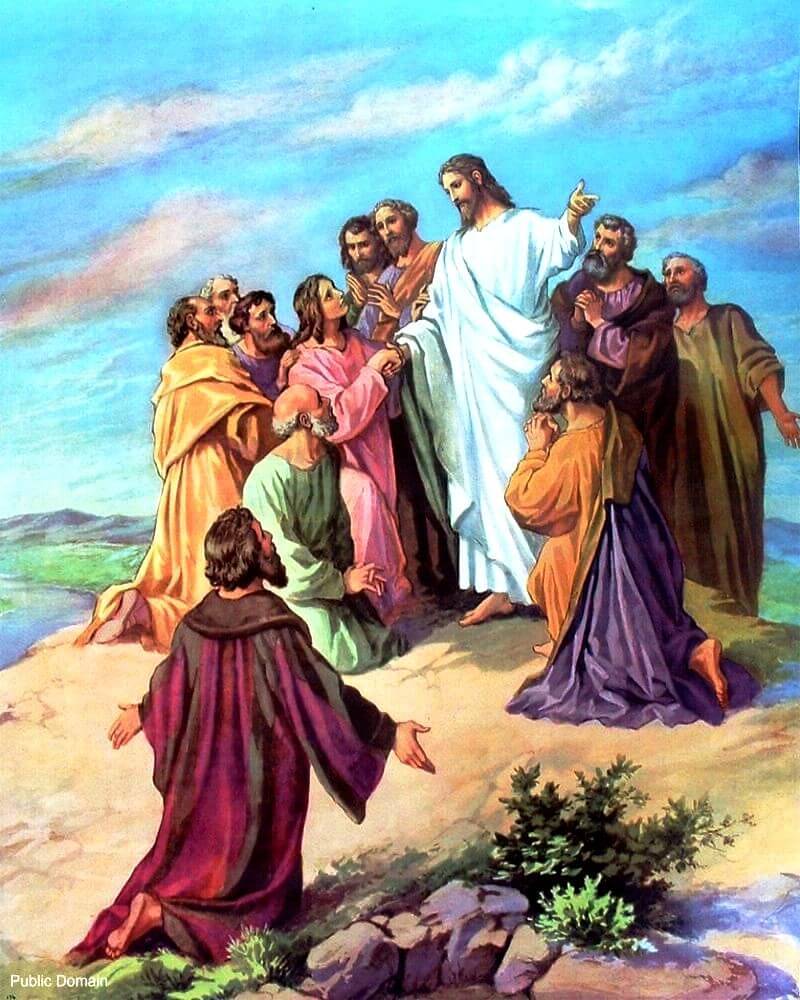
Feast of the Ascension
Fr. Mark Gatto
Preached: May 24, 2020
Baptism is not something that we receive, it is about who we become and who we are called to be.
Who are we called to be in the light of our baptism?
In baptism, we are reborn by water and the Spirit, therefore we can truly say we are children of God.
In baptism, we are united to Jesus, so we can say that we are brothers and sisters of Jesus.
Baptized in the name of the Father and of the Son and of the Holy Spirit, we are the people of God who dwell within the heart of God, who is a communion of love.
In baptism, the power of the Holy Spirit comes upon us, so that we are to be witnesses of Jesus to the ends of the earth.
In baptism, we entered the church, to be the body of Christ.
Look into the waters of your baptism, see who you are. Child of God, brother or sister of Jesus, lover living in the Holy Trinity, witness of Jesus, member of the body of Christ. What dignity, what beauty, the incredible mystery of who you are. See who you are, not with pride, but with humble gratitude.
The Feast of the Ascension is also about the followers of Jesus coming to see and live who they were called to be. Jesus sends the Apostles out saying, “Go therefore and make disciples of all nations …”
We are disciples of Jesus. We are responsible for continuing the mission of Jesus. To preach the Gos-pel, to bring healing and peace. We are to be instruments of reconciliation, helping each other to be rec-onciled to God and reconciled to one another. Our challenge is to live as disciples of Jesus, sharing in the mission of Jesus.
Someone tells a legend about Jesus’ arrival in heaven. There a vast host of angels greeted him. After the formalities, they asked him whom he had left behind on earth to finish the work he had begun. Jesus replied, “Just a small group of men and women who love me.” “That’s all?” asked the angels, aston-ished. “What if this tiny group should fail?” Jesus replied, “I have no other plans.”
Jesus has no other plans but us. In our baptism, we are called to be disciples of Jesus, to continue the work of Jesus. We are those left to continue the mission of Jesus. We are to preach the Gospel, to bring healing and forgiveness, to be instruments of reconciliation with God and one another. Look deeply into the mystery of Christ, feel yourself within the Holy Trinity, see who you are called to be.
St. Teresa of Avila captures this mystery of who we are in her famous prayer:
Christ has No body on earth but yours; No hands but yours; No feet but yours; Yours are the eyes through which he is to look out Christ’s compassion to the world; Yours are the feet with which he is to go about doing good; Yours the hands with which he is to bless now.
He Has Not Left Us – Fr. David

Feast of the Ascension 2018
Fr. David Reitzel
Preached: Sunday May 13, 2018
Today in the Canadian Church we celebrate the solemnity of the Ascension of Jesus. We recall when, as St. Luke tells us, 40 days after Jesus rose from the dead he gathered his disciples to himself, gave them their mission to be his witnesses to the end of the earth, and then was lifted up while a cloud took him from their sight.
The mystery we contemplate today is a popular one. It’s in the creed when we say, “he ascended into heaven.” We meditate on it every time we pray the Glorious Mysteries of the Rosary, and it is something that many spiritual authors have written on. Given all this focus that the Church places on the Ascension of Christ, it’s odd that this mystery is often the least understood.
When we think of the Ascension we usually think of it in negative terms. When Jesus ascended into heaven, he “left” us. He went away. He is no longer with us. If that’s what is taking place why is this a Glorious Mystery in the Rosary? Sound more like a Sorrowful Mystery. Perhaps we think, “well, he’s going to heaven which is good . . .for him. . . but what about us?”. I mean, wouldn’t it have been better if Jesus stayed, if he remained with us, and led his Church in its mission to spread the message to all the world?
I’ll admit that sometimes I fall into that way of thinking. But the truth is, this way of thinking misses what actually took place at the Ascension. When Jesus was taken up, he was not taken away from us. When Jesus ascended he entered into union with God his Father and that union transformed the way in which Jesus is present to us.
Before the Ascension when Jesus walked this earth was only present in one place at one time. That is why only a limited number of people actually saw Jesus in history. He walked in Jerusalem and people saw him there. He walked in Galilee and people saw him there. But no one in Greece ever met Jesus. No one in the city of Rome ever had a chance to speak with him. So long as Jesus walked this earth in the flesh he could not be present to all. But now that he sits at the right hand of His Father in heaven he can be present to everyone. You and I can pray to Jesus, experience his presence and love wherever we are because he reigns in heaven.
Pope Benedict XVI put it this way, “He has not ‘gone away’, but now and forever by God’s own power he is present with us and for us.”
One who understood this well was St. Therese of Lisieux. She knew that going to heaven did not mean being separated from people here on earth. Thinking of her own death she said, “When I die, I will send down a shower of roses from the heavens, I will spend my heaven by doing good on earth.” St. Therese understood that heaven is a place where all the limitations that separate us here in life are removed. She knew that she could do greater good for her sisters in heaven because in heaven she was more united to God and more united to them than ever before.
The unity that Jesus has with us since his ascension into heaven is far greater than when even St. Therese was speaking of. Jesus is now present to us as the divine Son of the heavenly father, as God who is present in all of creation, and who, since the day of Pentecost, is present most especially in those who have received the Spirit.
For each one of you here, Jesus dwells in you, and he does that because he ascended to his Father. So let’s not think that this mystery of the Ascension is about Jesus leaving his disciples and his Church. Today we celebrate when Jesus became present to each and every one of us. If you want to take advantage of this presence then pray to Jesus, call upon him, and trust that he will guide you in all places and times of life because he is present in it all.
He has not left us. He has not gone away. He is closer than he ever has been before.
Grow Up! – Fr. Mark

Feast Of The Ascension 2018
Fr. Mark Gatto
Preached: May 13, 2018
Grow up. Has anyone ever told you that before? Be Mature. Stop waiting for someone else to do something. Grow up. Perhaps a blunt way to explain the meaning of the Feast of the Ascension.
The Ascension is not so much about Jesus going away But about the disciples of Jesus, the early Church, growing up, becoming mature, taking responsibility for the mission of Jesus. They were no longer sitting around waiting for God to do something. It was now up to them. God was going to do something, but through them.
Jesus commissions them to go out and proclaim the Gospel. Gospel means Good News. Good news, not bad news. Sometimes we Christians sound like people of bad news, always complaining about people, about the world, how bad it is. But, we are to proclaim Good News. We do this by how we live and by how we speak.
Proclaim the Gospel, the Good News. Does the way we speak to one another proclaim Good news? Look at the way you speak to your spouse, the way you speak to your children, the way you speak to friends, the way you speak to your co-workers.
Is it Good News, does it bring hope, encouragement. Does it lead to communion or does it tear down, discourage, criticize all the time? Does our language and way of speaking to others build up or tear down? Is it good news or bad news?
Pope Francis in his Message for World Communication Day this year, included a prayer based on the Prayer of St. Francis. It is called Pope Francis’ Prayer for Countering “Fake News” It is about how we speak, how we communicate to others. In our relationships and also relevant to social media today.
You can find this prayer on line. A good prayer for most of us to use even as a reflection on how I am communicating and speaking to others in my life. (find it online)
So, you will all be sent out from here today, Go and announce the Gospel of the Lord.
On this feast of the Ascension, the blunt message we need to hear is:
Grow Up, become mature Christians. Stop sitting around waiting for God to do something. God wants to work through you. Take responsibility for the mission of the church. Do not wait for the Pope, or the priest or some other person to do this. Do not wait for God to do something.
Go and proclaim Good news. And in particular bring Good news by the way you speak to others, at home, at school, at work, on social media. By your words bring communion, build up and not tear down, bring goodness.
